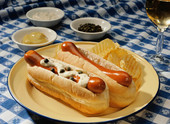 |
 |
 |
||
    |
||||
|
||||

Hidden Salt in Diet Haunts Many With Heart Failure
Study finds high sodium intake, despite efforts to cut back|
|
HealthDay
By Jennifer Thomas
Saturday, April 25, 2009
 SATURDAY, April 25 (HealthDay News) -- Eating a low-salt diet is one of the most important lifestyle changes people with heart failure can make, but only a third adhere to the recommendation, a new study has found.
SATURDAY, April 25 (HealthDay News) -- Eating a low-salt diet is one of the most important lifestyle changes people with heart failure can make, but only a third adhere to the recommendation, a new study has found.
Researchers asked 116 people with heart failure to write down everything they ate for three days. Though the recommended daily intake of sodium for people with heart failure is 2,000 milligrams, participants in the study were consuming an average of 2,671 mg a day.
Many weren't purposefully ignoring doctor's recommendations, said study co-author Carolyn M. Reilly, a postdoctoral fellow at Emory University in Atlanta. Most thought they were taking steps to reduce their sodium by putting less salt on their foods, but she said they were focused on the wrong target.
About 70 percent of the sodium in the American diet comes from processed foods such as canned soups, lunch meats and fast food, not from salt added to home-cooked meals.
Sodium is added to foods to give them a longer shelf life, enhance texture and mask bitterness.
"There is so much salt hidden in foods that patients aren't aware of," Reilly said in a news release from the American Heart Association.
The research was to be presented Saturday at the American Heart Association's 10th Scientific Forum on Quality of Care and Outcomes Research in Cardiovascular Disease and Stroke in Washington, D.C.
The American Heart Association recommends that healthy people try to eat less than 2,300 mg of salt a day. Some people -- including blacks, middle-aged and older adults and people with high blood pressure -- should aim for less than 1,500 mg a day.
"The patients themselves were shocked to find out they were eating more than 2,000 mg of sodium a day," Reilly said.
Some of the highest-sodium foods eaten by the study participants included hot dogs, sausage and bacon, canned soups, salad dressings, condiments, fast food, lunch meat, bread, pizza, processed entrees, prepared grits and cornbread.
HealthDay
Copyright (c) 2009 ScoutNews, LLC. All rights reserved.
Related News:
More News on this Date
Related MedlinePlus Pages:
| Home | Health Topics | Drugs & Supplements | Encyclopedia | Dictionary | News | Directories | Other Resources | |
| Disclaimers | Copyright | Privacy | Accessibility | Quality Guidelines U.S. National Library of Medicine, 8600 Rockville Pike, Bethesda, MD 20894 National Institutes of Health | Department of Health & Human Services |
Date last updated: 27 April 2009 |
